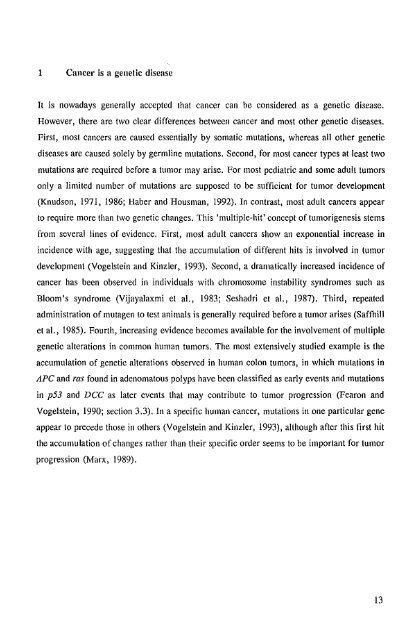View PDF Version - RePub - Erasmus Universiteit Rotterdam
View PDF Version - RePub - Erasmus Universiteit Rotterdam
View PDF Version - RePub - Erasmus Universiteit Rotterdam
You also want an ePaper? Increase the reach of your titles
YUMPU automatically turns print PDFs into web optimized ePapers that Google loves.
1 Cancer is a genetic disease<br />
It is nowadays generally accepted that cancer can be considered as a genetic disease.<br />
However, there are two clear differences between cancer and most other genetic diseases.<br />
First, most cancers are caused essentially by somatic mutations, whereas all other genetic<br />
diseases are caused solely by germline mutations. Second, for most cancer types at least two<br />
mutations are required before a tumor may arise. For most pediatric and some adult tumors<br />
only a limited number of mutations are supposed to be sufficient for tumor development<br />
(Knudson, 1971, 1986; Haber and Housman, 1992). In contrast, most adult cancers appear<br />
to require more than two genetic changes. This 'multiple-hit' concept of tumorigenesis stems<br />
from several lines of evidence. First, most adult cancers show an exponential increase in<br />
incidence with age, suggesting that the accumulation of different hits is involved in tumor<br />
development (Vogelstein and Kinzler, 1993). Second, a dramatically increased incidence of<br />
cancer has been observed in individuals with chromosome instability syndromes such as<br />
Bloom's syndrome (Vijayalaxmi et aI., 1983; Seshadri et aI., 1987). Third, repeated<br />
administration of mutagen to test animals is generally required before a tumor arises (Saffhill<br />
et aI., 1985). Fourth, increasing evidence becomes available for the involvement of multiple<br />
genetic alterations in common human tumors. The most extensively studied example is the<br />
accumulation of genetic alterations observed in human colon tumors, in which mutations in<br />
APe and ras found in adenomatous polyps have been classified as early events and mutations<br />
in p53 and Dee as later events that may contribute to tumor progression (Fearon and<br />
Vogelstein, 1990; section 3.3). In a specific human cancer, mutations in one particular gene<br />
appear to precede those in others (Vogelstein and Kinzler, 1993), although after this first hit<br />
the accumulation of changes rather than their specific order seems to be important for tumor<br />
progression (Marx, 1989).<br />
13
















